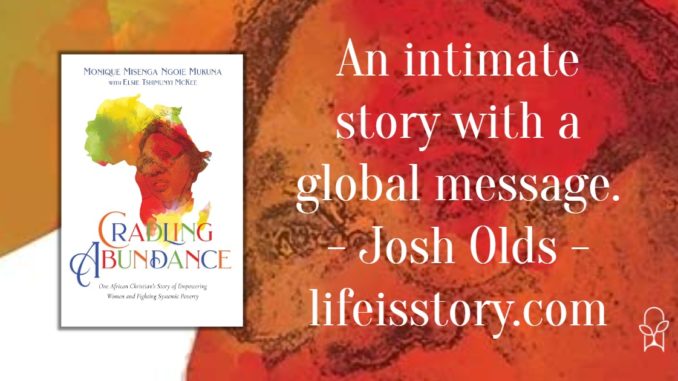
Published by IVP Academic on July 27, 2021
Genres: Academic, Non-Fiction, Biography, Memoir
Buy on Amazon
Goodreads

Growing up in the Democratic Republic of Congo, Monique Misenga Ngoie Mukuna persevered through many challenges: political turmoil and violence, misogyny and patriarchy, lack of community resources and personal loss. As she carved out a life for herself, her family, and her community, she kept seeing the same story played out for women vulnerable and trapped in poverty. Every system was stacked against them. So Maman Monique committed to take action in every sphere she could: through education, the local and national church, and international cooperation. In 1999 she joined with other Christian women to start the nonprofit Femme, Berceau de l'Abondance--Woman, Cradle of Abundance. The very personal story of Maman Monique opens a unique window on the lives of women in Congo, across Africa, and throughout the Majority World. In Cradling Abundance she recounts her remarkable experiences as a gifted student and teacher, successful businesswoman, local and denominational church leader, visionary social activist, and matriarch for her extended family. With stories of other African women woven in, this narrative presents a panoramic view of Christian women at work at every level of the church and community. We see the resistance they face even within their own congregations and families, as well as how their faith leads them to oppose injustice, discrimination, and suffering. Professor Elsie McKee introduces the autobiography of her friend Maman Monique (translating it from conversations in French and Tshiluba), then provides helpful historical background and textual notes throughout, along with a study guide to additional cultural information. For anyone interested in how lay women lead in Christian ministries, what it takes to start a pioneering nonprofit, or how empowering women is critical to the health of communities, Cradling Abundance is a unique and gripping resource.
Cradling Abundance is an African story of an African Christian who, within her highly patriarchal culture, fought to empower women and resist systemic poverty and injustice. Monique Misenga Ngoie Mukuna is a lay leader in the Presbyterian Church in the Democratic Republic of Congo. She is the founder of the nonprofit organization FEBA (Femme, Berceau de l’Abondance [Woman, Cradle of Abundance]) and has dedicated her life to changing her society’s culture to address systemic poverty and violence against women.
Cradling Abundance is a first-person biography, based on recorded interviews over the course of several years, put into written form by historian Elsie Tshimunyi McKee. McKee retains the format of an oral history, only editorializing to provide clarity on culture or context. This isn’t a political history or a sociological investigation, meaning that readers are thrown into Maman Monique’s world with only the barest of context. McKee provides a chapter of introduction to set up the bare-bones structure, but for the most part readers are left to be hyper-focused on Maman Monique’s story. And that’s a good thing. Too often, Africa—or really any non-Western nation—can be treated like a collection of issues rather than real-life people. We tell the stories from 20,000 feet as history, but never zoom in to focus on the daily lives of the everyday people. This focus, interspersed with short vignettes of others in Maman Monique’s life, provides an intimate look at the people of and culture of Democratic Republic of Congo.
The story begins in a rather shocking way. The place is Zaire (now Democratic Republic of Congo), in the middle of Africa. The time is 1972, under the rule of General Sese Seko Mobutu. Mukuna describes a trip where her public transport was stopped by a military barricade. These sorts of barricades had been forbidden by Mobutu as the soldiers often used them as an excuse to steal from passengers. But is the face of men with guns, only Monique Misenga Ngoie Mukuna was brave enough to remind the men of that rule. Reluctantly, the men returned the things and let everyone go.
When we got to the stop where my father would meet my brother and me, all the people in the truck told my father, “What a child you have, what a daughter! No, she is not a daughter; she is a man! She saved us.
It’s in this passage that you begin to understand the core of who Maman Monique is and what she has given her life to fight against. Patriarchal thinking runs so deep that women were seen as property. A woman who acts bravely is “honored” with the status of man for her valor. As the book runs chronologically, the early chapters set up the culture and familial context of Mukuna’s life, particularly noting the counter-cultural influence of her father who ensured that she was well-educated and did not think of herself as less than a man.
The middle chapters show how that foundation grew roots and began to sprout, even amid adversity and tragedy. Mukuna becomes an educator and entrepreneur, teaching French and history in Kinshasa and starting a business selling baby clothes. By the mid-1990s, Mukuna had expanded into role of church leadership, in particular serving as assistant director for the Department of Women and Families in the Presbyterian church in the Congo. Even as Mukuna’s role grows, the narrative stays small and connected to the families and people in poverty. This isn’t a story of a woman’s rise out of poverty but how a woman lifted others out of poverty along her own journey.
The last part of the book is where that you really begin to see the fruit of Mukuna’s perseverance and the tone shifts from biography to some discussion of theory and application. No longer just “here is what happened” but “here is why we did it and why it worked.” Above all, Mukuna advocates for the need of education. Educated women who can advocate for themselves alleviated poverty and reduce violence. Women taking the lead in revolutionizing their culture is seen as the pathway to flourishing.
In all, Cradling Abundance is an intimate story with a global message. You can pull from this story powerful lessons on women in leadership, on social justice initiatives, on empowering local communities, on missionary work that helps rather than hurts, and on and on. It’s a beautiful story of a beautiful woman, a faithful servant of God who serves as an inspiration and guide for many.



